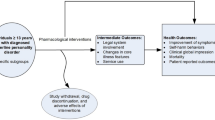Abstract
The relationship between forgiveness and borderline personality symptomatology has been rarely studied. Using a consecutive cross-sectional sample of 307 internal medicine outpatients and a survey methodology, we examined correlations between the Forgiveness Scale and borderline personality symptomatology as measured by the borderline personality disorder scale of the Personality Diagnostic Questionnaire-4 and the Self-Harm Inventory. Numerous forgiveness subscales as well as the composite Forgiveness Scale score demonstrated statistically significant relationships with both measures for borderline personality symptomatology, such that individuals with this personality pathology demonstrated lower scores on these forgiveness subscales. Findings indicate that among individuals with borderline personality symptomatology, there are numerous aspects of forgiveness that are significantly lower than in individuals without this symptomatology.

Similar content being viewed by others
References
American Psychiatric Association. (1994). Diagnostic and statistical manual of mental disorders (4th ed.). Washington, DC: Author.
Avery, C. M. (2008). The relationship between self-forgiveness and health: Mediating variables and implications for well-being. Dissertation Abstracts International, 69, 1939B.
Ball, V. (2010). Forgiveness and adjustment in women who have experienced trauma. Dissertation Abstracts International, 70, 5805B.
Brown, R. P., & Phillips, A. (2005). Letting bygones be bygones: Further evidence for the validity of the Tendency to Forgive Scale. Personality and Individual Differences, 38, 627–638.
Connor, K. M., Davidson, J. R. T., & Lee, L.-C. (2003). Spirituality, resilience, and anger in survivors of violent trauma: A community survey. Journal of Traumatic Stress, 16, 487–494.
Copeland, K. A. (2007). Sexual trauma, forgiveness, and health. Dissertation Abstracts International, 68, 4126B.
Desjarlais, V. W. (2005). Forgiveness, affect and life situation among community-dwelling rural elders: A correlational study. Dissertation Abstracts International, 66, 614B.
Dubro, A. F., Wetzler, S., & Kahn, M. W. (1988). A comparison of three self-report questionnaires for the diagnosis of DSM-III personality disorders. Journal of Personality Disorders, 2, 256–266.
Faison, M. W. (2007). The relationship of forgiveness to psychological resilience and health among African American women. Dissertation Abstracts International, 68, 1552B.
Holm, A. L., Berg, A., & Severinsson, E. (2009). Longing for reconciliation: A challenge for women with borderline personality disorder. Issues in Mental Health Nursing, 30, 560–568.
Hyler, S. E. (1994). Personality Diagnostic Questionnaire-4. New York: Author.
Hyler, S. E., Lyons, M., Rieder, R. O., Young, L., Williams, J. B. W., & Spitzer, R. L. (1990). The factor structure of self-report DSM-III Axis II symptoms and their relationship to clinicians’ ratings. American Journal Psychiatry, 147, 751–757.
Idler, E. (2010). Forgiveness. Located at: http://www.fetzer.org/component/content/article/18-main/248-dses (pp. 35–37). Accessed on December 7, 2010.
Johnson, J. G., & Bornstein, R. F. (1992). Utility of the Personality Diagnostic Questionnaire-Revised in a nonclinical population. Journal of Personality Disorders, 6, 450–457.
Johnstone, B., & Yoon, D. P. (2009). Relationships between the Brief Multidimensional Measure of Religiousness/Spirituality and health outcomes for a heterogeneous rehabilitation population. Rehabilitation Psychology, 54, 422–431.
Kolb, J. E., & Gunderson, J. G. (1980). Diagnosing borderlines with a semi-structured interview. Archives of General Psychiatry, 37, 37–41.
Miller, A. J., & Worthington, E. L. (2010). Sex differences in forgiveness and mental health in recently married couples. The Journal of Positive Psychology, 5, 12–23.
Nelson-Pechota, M. (2004). Spirituality in support-seeking Vietnam veterans: Guilt, forgiveness, and other correlates of long term adjustment to combat-related trauma. Dissertation Abstracts International, 64, 6337B.
Patrick, J., Links, P., Van Reekum, R., & Mitton, M. J. E. (1995). Using the PDQ-R BPD scale as a brief screening measure in the differential diagnosis of personality disorder. Journal of Personality Disorders, 9, 266–274.
Plante, T. G. (2009). Spiritual practices in psychotherapy: Thirteen tools for enhancing psychological health. Washington, DC: American Psychological Association.
Pope, S. K., Beck, C., Shue, V. M., & Cook, S. C. (2003). The role of religion and forgiveness in the mental health of Arkansans attending senior citizens’ centers. Marriage and Family: A Christian Journal, 6, 113–122.
Rippentrop, A. E. (2004). The relationship between religiosity/spirituality and health outcomes in a chronic pain population. Dissertation Abstracts International, 64, 3539B.
Rye, M. S., Folck, C. D., Heim, T. A., Olszewski, B. T., & Traina, E. (2004). Forgiveness of an ex-spouse: How does it related to mental health following a divorce? Journal of Divorce and Remarriage, 41, 31–51.
Sansone, R. A., Wiederman, M. W., & Sansone, L. A. (1998). The Self-Harm Inventory (SHI): Development of a scale for identifying self-destructive behaviors and borderline personality disorder. Journal of Clinical Psychology, 54, 973–983.
Stammel, N., & Knaevelsrud, D. (2009). Forgiveness and mental health after traumatic experiences. Trauma and Gewalt, 3, 34–41.
Toussaint, L., & Jorgensen, K. M. (2008). Inter-parental conflict, parent-child relationship quality, and adjustment in Christian adolescents: Forgiveness as a mediating variable. Journal of Psychology and Christianity, 27, 337–346.
Tseng, W.-C. (2008). Resilience in life events, interpersonal strength, and mental health among college students: An examination of mediation and moderation effects. Bulletin of Educational Psychology, 40, 239–259.
Van Dyke, C. J., & Elias, M. J. (2007). How forgiveness, purpose, and religiosity are related to the mental health of well-being of youth: A review of the literature. Mental Health, Religion and Culture, 10, 395–415.
Webb, J. R., Robinson, E. A. R., & Brower, K. J. (2009). Forgiveness and mental health among people entering outpatient treatment with alcohol problems. Alcoholism Treatment Quarterly, 27, 368–388.
Author information
Authors and Affiliations
Corresponding author
Additional information
Dr. Sansone has published over 300 refereed articles, co-authored 36 book chapters, co-edited two books, and co-authored two books; His academic interests include borderline personality and eating disorders.
Ms. Kelley is presently completing medical school and seeking a residency position in psychiatry.
Dr. Forbis’ area of interest is population epidemiology.
Rights and permissions
About this article
Cite this article
Sansone, R.A., Kelley, A.R. & Forbis, J.S. The Relationship Between Forgiveness and Borderline Personality Symptomatology. J Relig Health 52, 974–980 (2013). https://doi.org/10.1007/s10943-013-9704-3
Published:
Issue Date:
DOI: https://doi.org/10.1007/s10943-013-9704-3



